OLD POST ALERT! This is an older post and although you might find some useful tips, any technical or publishing information is likely to be out of date. Please click on Start Here on the menu bar above to find links to my most useful articles, videos and podcast. Thanks and happy writing! – Joanna Penn
I am just back from an amazing Thrillerfest, the annual convention of the International Thriller Writers in New York. I cannot recommend it highly enough if you're a thriller writer, or aspiring to be one.

I hope you find this useful and if this is your chosen genre, I hope you will also consider joining me next year at Thrillerfest. It was definitely a fantastic thing to do for my career as an author. I have tried to attribute comments where possible but the notes are all paraphrased so there may be errors, which are entirely my own.
The craft of writing
- If you're struggling with writing a character, write 20 things that the reader will never know about your character. These will naturally bleed into your writing and provide a richness even though you don't share the detail. [Barbara Poelle, Agent]
- In mysteries, red herrings are OK, lies are not. The ending must be surprising, but also inevitable. [Barbara Poelle, Agent]
- When a character is hanging by two fingers, chop one off. [Sophie Littlefield, author]
- How to make your readers cry: (a) say goodbye to a beloved character (b) say welcome home – all is forgiven [Donald Maass, Agent]
- How to make your readers angry and send you hate mail: Torture, maim or kill an animal (but you can do anything to people and get away with it!) [Sandra Brown, author]
- Keep the reader turning the page. No happy people in happy land. [James Scott Bell, author]
- There are no rules. We're storytellers. There's nothing wrong with telling sometimes. Why not start with the weather? Don't lock your writing into procedural rules. Keep asking questions because people will always want to know the answer. Open a question and don't answer it until the end. [Lee Child, author]
- Voice is literally the voice of the narrator. The written word is new. People have listened to stories for millennia. Your voice is the voice of the storyteller around the campfire. Our writing is an imitation of an audible experience. [Lee Child]
- The book is a snapshot of who you were at one point in time. You can't change it. It's who you were. [Lee Child]
- On writing a series. A series book is pre-approved by an audience who want the same caliber of experience. Why would Lee Child write something other than Reacher when he is the guy who writes Reacher, and people love those books? You have to work on keeping the series the same so people get what they expect. The contract with the reader is critical. Individually, we don't have to write everything. As an author collective, we cover all bases.
- “The reader is god.” Jeffrey Deaver, quoted by CJ Lyons. If you use this as your compass, you'll never go wrong. How can you please more readers?
Writing fight scenes and the ethical warrior
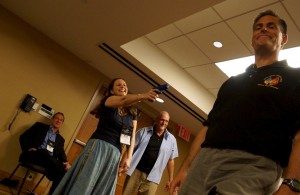
The following notes are from a session on the ethical warrior and writing fight scenes with Jack Hoban, from the Marine Martial Arts Program, Quantico. Amusingly, I was picked to play a helpless female who needed rescuing but I managed to take the gun off Jack.
- It is not natural to kill another human. You have to be trained to do it. If your character has to kill or injure someone, they can't just walk away. You can reduce psychological harm (and PTSD) by ensuring the individual acts in a moral sense. This cannot be based on relative values, which mean different things to different people e.g. religion, culture, race, way of life. Dehumanizing people leads to amoral action as has been seen in Rwanda, Nazi Germany and other places. Action and violence have to be based on human equality – the life value – and protecting that. Switch the emphasis to protector of life and those important to you, rather than an aggressor. Think that people are safer because of you and your skills. The philosophy of a hero is “I am your equal. My life and the lives of my loved ones are as important as yours.”
- Ethics are moral values you act upon. It takes guts and skills. To overcome the freeze or flee response, to risk yourself, takes courage. You are the protector of all life, with no differentiation between lives. If you think one life is worth more than another, this becomes a relative value. The combat mindset must include the core of life value as well as physical ability and mental toughness. This is the basis of the ethical warrior. The switch is violence as aggression to violence as protection.
- To understand more about this, read ‘The Ethical Warrior' by Jack E. Hoban. Also recommended: ‘On Killing' by Lt Col Dave Grossman; ‘Meditations on Violence' by Rory Miller.
Publishing, agents and self-publishing
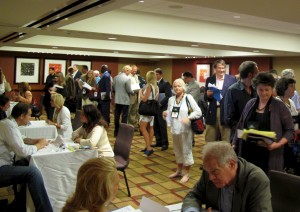
Agentfest was part of the convention where aspiring authors were able to pitch to four rooms of agents. You only had around four minutes with each agent but there was extensive information about what they were looking for, so you could target the right people. It was a kind of speed dating, as shown in the picture right.
The session was incredibly well organized and everyone I spoke to enjoyed it far more than expected. Most authors were also asked for partials or full manuscripts by at least one agent so it is a great way to move up the slush pile.
- Tips on pitching agents. One technique is to use the “What if? So What?” approach. e.g. What if a young girl risks her soul to love a vampire? What if a cyborg is sent back in time to kill the mother of the savior of mankind? Aim for less than 25 words. [Kathleen Antrim, author]
- The pitch is more about why do we care? The emotion behind the story. Or lead with your strength e.g. what's special about you and this book? Do you already have a platform? Are you an ex-CIA agent writing CIA thrillers? [Jon Land, author]
- Be proactive about getting your rights exploited. Study the publishers and what they are strong in, and then look at what else can be done. You don't know how people will discover you so the more formats your work is in, the better. Ebooks have a global market from day 1 and the global ebook market is starting to grow much faster, as the US growth slows.
- Publishing is the selling of a creative product where there are 10 million alternatives. This is a risky business. [Simon Lipskar, agent]
- If you don't think the representation you're getting is worth more than the commission you're paying, then fire your agent. [Simon Lipskar, agent]
Book marketing
- No book ever dies nowadays as it can be bought online forever, so throw out the old school publishing paradigm of the launch period. The book is new to anyone who has never read your book and finds it. No reader cares about a book being new or old. If it's a good book, people want to read it. Every day is a new day that people can discover your books. [MJ Rose, author and marketing expert]
- The average publishing spend on marketing is around $2000. The burden of marketing is on the author regardless of publishing method. A publisher expects you to have a website, a blog, Facebook, Twitter, Pinterest and an email list/newsletter. These are the basics so you need at least some of these. You have to find some way to interact with the world. [MJ Rose, author and marketing expert]
- Connect the author to a story to make it newsworthy. What non-fiction aspects can you use to blog about or write articles about? For example, in my ARKANE novels, I use aspects of religion, psychology, art, architecture and travel so I could write articles or use images of things that fit into these categories which will attract people in those niches. I'm doing this now at JFPenn.com and Pinterest/JFPenn.
- People overestimate the importance of marketing. The most important thing is to write the next great book. This was said by a number of people, most notably my friend CJ Lyons, shown with me on the right.
On being a professional author-entrepreneur
- Authors who succeed, who survive, are authors who love to write, who return to the love of writing again and again. The ups and downs of publishing will drive you crazy, so to survive, focus on what you love. [Lisa Gardner, author.]
- The more you can understand your own process as a writer, the more you can enable it. For example, do you write in a linear fashion or out of order? Are you a pantser or a plotter? Do you like actually writing, or having written? Everyone is different but you need to understand where you fit on the continuum. [Lisa Gardner]
- There are things you can do to encourage the muse. (a) Positive association. This is critical. Any day you write is a good day. Stop beating yourself up and find ways to make this a positive process. (b) Pavlovian responses. It takes 2 weeks to create a habit. You can create a writing habit with something that immediately creates the need to write. For example, scented candles, a designated computer or a designated writing space, a certain time of day. Think: when X happens, then I write. (c) Incentive systems. Bribing yourself is fine. For example, on pg 100, I go to the spa. Set celebration milestones for your books or the success will just pass you by. [Lisa Gardner]
- Everyone who writes for a living is an entrepreneur. Our time, exertion and creativity are investments we want to be paid for. You need to know the detail of your rights so you can protect them for the long term. Publishing is changing so fast and no one knows what the future will bring. If you're offered a publishing contract, consider what the publisher will bring you and examine the terms carefully. [Joseph Finder, author]
- Building a brand involves consistency of cover image, of voice and reading experience, of taglines or recurring themes in the books. People enjoy familiarity. Brand comes down to trust. The reader must trust what they are about to read. You can't disappoint them. It is also about differentiating your product from the rest.
My personal experience
- The long-term career path. I have spent the last few months trying to get to grips with being a full-time fiction author. I have been challenged by Steven Pressfield's ‘Turning Pro' and this convention was an extension of those lessons. To have a successful career as an author, you have to write, consistently and regularly, over a long period of time.The big name authors here are generally in their 50s and 60s, many with hundreds of books to their names. That is an awesome path to follow and this event definitely made me want to follow in their footsteps. I felt both inadequate and a total newbie, but also inspired enough to want to be able to say I have sold X million books one day. I highly recommend conventions like this for a kick up the butt and also inspiration for the future. I'm at the bottom of the ladder right now, but I can see the guys at the top 🙂
- I still feel conflicted over trad vs indie publishing. I know I love writing and marketing – they will happen regardless, and to a point, I know what I have to do. But publishing continues to be something I am unsure of. I joined in with Agentfest and pitched to a few agents who were suited to my ARKANE series. I had requests for the full manuscripts from a number of them, and I sent the books to those who I connected with. I'll let you know any news if there is some, but part of me loves the control of being indie. Ideally I will be a hybrid author as I continue with my career, with one foot in either camp. Watch this space for updates 🙂
Have you found conventions useful? What do you think about some of my lessons learned? Please do leave a comment.
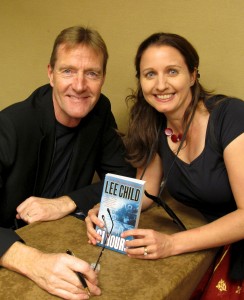
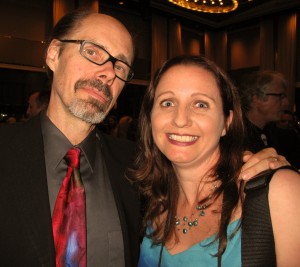
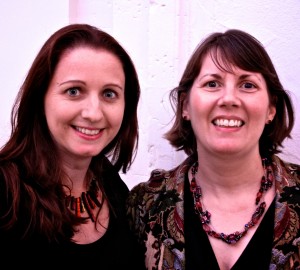
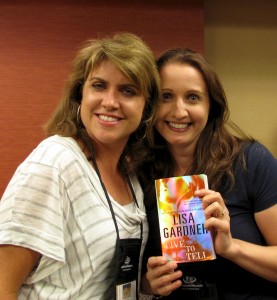
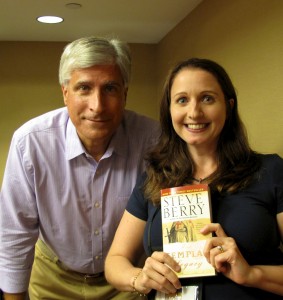


Great recap of the conference. It was so valuable- I can’t say how much I enjoyed it AND your review! I learned so much. Again, lovely to meet you!
In addition, talking about feeling good and not beating yourself up, I find once I know I can succeed one time the following times are easier. For example, about nine years ago I sat down to write a new poetry draft a day over a year, to see if it could be done, and I not only succeeded I wrote more than 500 first drafts over a year, and very little sucked. I found that year hard, and i struggled, but four times since, including this year, I’ve succeeded in writing at least 400 poems over a year, and in writing more and more often in the “off” years as well.
It’s not only a positive thing I know I can do and feel good about, it’s a habit I’ve trained myself into, and I’ve been extending it to other aspects of my writing and life. I know I can do it; I know I can do more, and I feel great as a result.
Hi Joanna, I was at Borderlands Press Writer’s Bootcamp for the past three years with F Paul Wilson, Tom Monteleone and Doug Winter. Some of my fellow “grunts” will be attending Thrillerfest this year so I thought I’d join them. The trouble is, I own a restaurant at the Jersey Shore. Not only are we incredibly busy in July, I have a huge festival that weekend. I am personal friends with F Paul Wilson (who is a regular at my restaurant) and Jack Hoban (who plays Tuesday nights at the restaurant). They both feel I should make it happen. I wonder how I can bribe my husband so he’ll work the festival without me? Hmmm.. Thanks for your blog! Hope to meet you in NYC
I love Jack Hoban! He’s awesome 🙂 and yes, it’s very inspiring to attend Thrillerfest so maybe you could bribe your husband by offering to cover his time when he has something he wants to attend 🙂 It turns out I won’t be there this year though, since 3 brothers have decided to get married – so I have trips to New Zealand, Canada and Nigeria planned … New York in addition is a little much for the bank balance! But hopefully will be back there again another year. I’m doing the British crime festivals instead.
Aha! He’s going to Baltimore for a weekend of Yankees baseball with the boys! So that took care of Necon. Since I live an hour from the city, I can drive up each day. As for you, I’d love to have New Zealand and Nigeria stamps on my passport (We’re on our way to Toronto and Niagra in April). Good luck!